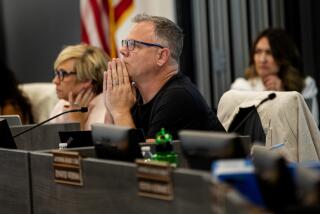Fear of Recall Trend Spread by Ouster of Covina City Council : Taxes: Observers say more officials will be scrutinizing their budgets after entire board is kicked out of office over a 6% utility levy.
- Share via
The resounding recall Tuesday of the entire Covina City Council because of the city’s 6% utility tax is the latest sign that voter resentment over new taxes and fees is growing, city officials, taxpayer groups and academics say.
“We’re seeing more and more of these recalls efforts, many of them successful, throughout the state,” said Alan Heslop, a professor of government studies at Claremont McKenna College. “Generally, money in the form of some kind of tax or fee is at the bottom of the dispute.”
“I suspect a lot of city council members throughout the state will be very frightened by what occurred in Covina,” said Sheri Erlewine, spokeswoman for the California League of Cities. “We are seeing recall being considered more and more in communities.”
“It’s ugly out there--every city is facing what Covina is facing,” Erlewine said. “There just isn’t enough money anymore to pay for what the people want.”
Record numbers of Covina voters, angry over the tax on gas, electricity, water and telephone bills that the council imposed last year to balance its budget, flocked to the polls to dump their council members. The vote set up an Oct. 5 special election in which five newcomers will be elected. Until then, current members will remain on the council.
“It’s tough. I’m extremely disappointed and I’m sorry for the community,” Councilman John King said. “I think we’re seeing a desperate moment in Covina’s history. Our financial problems won’t go away--it won’t be any easier for the new council.”
Mayor Henry Morgan and council members King, Chris Richardson, Chris Lancaster and Richard Gratton were defeated. Morgan will lose his seat on the South Coast Air Quality Management District.
All of them said they had done everything in their power to convince voters that they adopted the tax on utility bills only after cutting the city budget to the bone. Further cuts, they said, would weaken police, fire and library services.
But recall leaders argued that the tax would not be needed if the council had kept a tight rein on finances. The tax costs the average household about $12.60 a month.
“This recall will have a broad impact--cities will start checking their budgets two or three more times to make sure they’ve done everything possible to cut costs,” said Kris Vosburgh, executive director of the Howard Jarvis Taxpayers Assn.
A growing number of citizen groups have been calling his organization, he said, for advice on fighting new taxes and fees in their communities.
“The common thread is that these people feel their elected officials are detached, arrogant and don’t share the (financial) problems of the average taxpayer,” Vosburgh said.
The electorate of Covina, a town of 43,000 in the flatlands of the east San Gabriel Valley, includes a sizable population of elderly people on fixed incomes.
Retirees started the petition drive that forced the council into a recall election, helping to organize 200 volunteers and to raise about $8,000 in donations for pro-recall mailers and signs that dotted lawns throughout the community.
“We’re overwhelmed by the outcome,” said Stop the Utility Tax Committee leader Earl P. Purkhiser, a retired economics and accounting professor at Mt. San Antonio College in Walnut. “The next council will have to spend money like it was its own.”
City officials elsewhere say that they have had little choice but to raise taxes, but that educating the public is the key to avoiding voter backlash.
In Pasadena, where voters last month overwhelmingly approved a $1.3-million tax to bolster the library system, Mayor Rick Cole said the city’s yearlong campaign to educate residents on the need for the tax was the key to success.
Despite the successful recall drive in Covina over the utility tax, he said, it would be “stupid to draw the conclusion that you can’t raise taxes.”
Rather, he said, council members should realize that the public “can’t be railroaded,” and councils must take the time to build community understanding of their budget crisis and possible solutions before imposing a new tax.
The same day the Covina council went down to defeat, the nearby community of Sierra Madre tentatively approved a 6% utility tax. City officials said there was little opposition to the tax because the city reached out to the public at several community meetings to discuss the budget deficit.
Utility taxes have been around for years, but cities have increasingly turned to them, and to assessment fees that appear on property tax bills, during harsh economic times. Taxpayer groups say the taxes and fees are convenient ways to skirt Proposition 13 because most do not need to go before voters.
The anti-tax backlash in Covina is hardly unique. Over the last two years, several recall groups in the state have succeeded in recalling a majority of their council members.
Upset over an assessment for lighting and landscaping, voters in the Northern California town of Pacifica ousted four of five council members last year. In Morgan Hill, council approval of a 9% utility tax led to the recall of three of five council members in December, 1991.
For taxpayer groups, Covina’s recall election is convincing proof that the tax revolt of the Proposition 13 era is not dead.
“We think San Gabriel Valley governments will sit up and take notice that people want spending under control,” said Tom Biesek, a founding member of a citizen taxpayer association in South Pasadena that is fighting a proposed landscaping fee.
“We’ve maintained that there should be no tax increases without a vote (of the people),” Biesek said. “We admire the spunk of the Covina (recall) group in giving the electorate a chance to say yes or no.”
More to Read
Sign up for Essential California
The most important California stories and recommendations in your inbox every morning.
You may occasionally receive promotional content from the Los Angeles Times.










